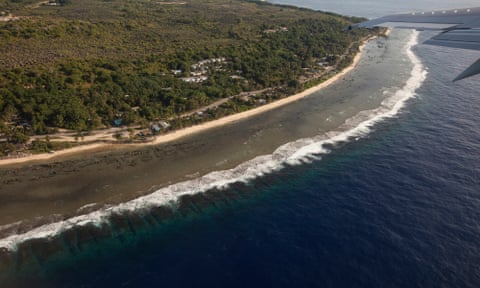Eight of the 11 asylum seekers taken to Nauru in September – including a woman and child – have returned to their country of origin.
In October Guardian Australia revealed the transfer, the first by Australia to the regional processing centre in nine years, which occurred just months after the last asylum seekers were removed from the Pacific nation.
The transfer resulted in renewed scrutiny of boat arrivals since Labor’s May 2022 election, which have included a further nine boats taken back to their country of origin.
Answers to questions on notice and the November 2023 Operation Sovereign Borders update confirm that a further 12 people who were found on the Western Australian coast in November have been sent to Nauru.
In the answers to the Senate legal and constitutional affairs committee, the home affairs department confirmed the September arrivals had been transferred to Nauru “by air, after transiting briefly through Australia, on 7 September 2023”.
This was done “in line with long standing policy under [Operation Sovereign Borders]” after health, identity and screening assessment processes.
“The Department conducts entry screening to ensure it does not refoule asylum seekers with legitimate protection claims, in breach of Australia’s international obligations.”
As at 3 November, eight of the 11 people who the department describes as “unauthorised maritime arrivals” had voluntarily returned home – but the answers refused to say where or give further details about the cohort.
There were no minors on Nauru on 3 November, after the child in the cohort returned home. The remaining three people were being held in regional processing centre 1 and “will remain in Nauru until their migration status is resolved or they otherwise depart”, the department said.
Ogy Simic, the director of advocacy at the Asylum Seeker Resource Centre, said the organisation was “deeply concerned by the complete lack of transparency and information provided to the Australian public” about the cohorts transferred to Nauru in September and November.
Simic said the answers give “no information” about where the eight asylum seekers returned to “and what process was followed”.
“It was also incredibly distressing to find out that the initial group transferred to Nauru included a child. The government’s refusal to answer questions about the activity on Nauru flies in the face of its own calls for greater transparency when in opposition.”
The Greens senator Nick McKim has also criticised the lack of transparency.
The Nauru processing centre costs at least $350m a year to run, although expenditure has fallen since more than 1,000 asylum seekers were kept on the island at a time.
Reports had linked reduced spending on the regional processing centre to Nauru’s decision to sever ties with Taiwan and recognise a one-China policy.
The Australian government denied there had been any change to the regional processing arrangements. The prime minister, Anthony Albanese, has said “the idea that we’ve been effective in reducing the costs of offshore detention is a good thing for Australian taxpayers”.
The department revealed there had been 250 people from nine maritime people-smuggling ventures between Labor’s election in May 2022 and 31 August 2023, all of whom had been “safely returned” to their country of origin or departure, Sri Lanka or Indonesia. It said 238 were subject to “on-water/enhanced screening assessment”.
In the five years to August 2023 there were 17 deaths in Australia’s onshore immigration detention facilities, including two in the 2022-23 financial year.
The answers reveal that the immigration minister, Andrew Giles, has issued 89 residence determinations, allowing people in onshore detention to be released into community detention.
Answers to the Liberal senator Paul Scarr reveal that 27 people had their visas cancelled for offences including sexual offences, assault and fraud.
The home affairs department noted a “residence determination is still a form of immigration detention”.
“While the detainees have freedom of movement within the community, they are required to reside at a specified address and abide by the associated conditions, including reporting and behavioural requirements,” it said.
In addition to the number of people-smuggling ventures to Australia, Labor has come under scrutiny over its legislative response to the high court’s NZYQ decision, in which it held that indefinite detention is unlawful where it is not possible to deport the unlawful non-citizen.
Before the November 2023 decision, the Albanese government was quietly releasing low-risk detainees in an attempt to clear what the department had conceded was an “intractable” caseload of people in detention.


